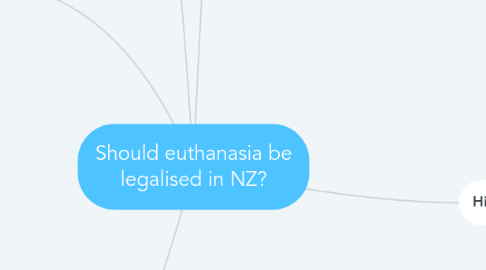
1. Religious Aspects
1.1. different religious viewpoints
1.1.1. Christians
1.1.2. Buddhist
1.1.3. Hinduism
1.1.4. Judaism
1.1.4.1. positive or negative
1.1.4.1.1. controversial outlooks within own religions
1.1.5. Roman catholic
1.1.6. atheists
1.1.6.1. Religions vs. atheist
1.2. Has religions become more liberal over time.
1.2.1. are opinions influenced by religious affiliations
1.3. How religions affect the medical profession.
1.3.1. what religions are more likely to practice euthanasia.
1.3.2. do religious affiliations affect their practice of euthanasia
1.4. the need for safeguards to protect religious medical professionals.
2. Patients rights
2.1. Internal factors
2.1.1. Age limit
2.1.2. Mental illness
2.1.2.1. Depression
2.1.2.2. Dementia
2.1.3. Terminal illness
2.1.4. Advance directive
2.2. External factors
2.2.1. Legal advice
2.2.2. Medical advice
2.2.2.1. Who pays for these safeguards
2.2.3. Counselling
2.2.4. Stand-down period
2.3. Decision making process
2.3.1. Undue influence
2.3.1.1. Prevention
2.3.1.2. Testing
2.3.2. 3rd party decision making
2.3.2.1. Who?
3. Health care
3.1. Medical Ethics
3.1.1. Principles of medical ethics
3.1.1.1. Autonomy
3.1.1.2. Justice
3.1.1.3. Benefience
3.1.1.4. Non-maleficence
3.2. Hippocratic Oath
3.2.1. an ethical foundation
3.2.2. viewpoints
3.3. Types of Euthanasia
3.3.1. active euthanasia
3.3.2. passive euthaasia
3.3.3. physician assisted suicide
3.3.4. ethical reasons
3.4. Palliative Care
3.4.1. as an alternative
3.4.2. it is overlooked
3.4.3. different ethical underpinnings
3.5. Health care professionals
3.5.1. negative impacts on doctors
3.5.2. fear of legal violation
4. Social Impacts
4.1. Impacts on family
4.1.1. Suicide vs Euthanasia
4.1.2. Criminal charges for 'assisted suicide'
4.1.2.1. Nagui Morcos case
4.2. Ethics & Morality
4.2.1. Difference euthanising animals vs humans
4.2.1.1. Animal Welfare Act 1999
4.2.2. Guidelines of Belmont Principles
4.2.2.1. Autonomy
4.2.2.2. Beneficience
4.2.2.3. Justice
4.3. Palliative Care Facilities
4.3.1. Undermines efforts of Hospice
4.3.2. Conflicting arguments- death with dignity
4.3.3. Law change (NT) led to funding for care facilities
4.3.4. Not always best option
4.4. Significance of death
4.4.1. Suicide prevention groups undermined
4.4.2. Slippery Slope/Foot in the door arguement
4.4.2.1. Milgram's experiment
5. History/Background
5.1. Countries where euthanasia is legalised
5.1.1. The Netherlands
5.1.1.1. Safeguards in place
5.1.1.2. First in world to legalise in 2000
5.1.1.3. Nurses role in decision making process not legally recognised
5.1.2. Belgium
5.1.2.1. Safeguards in place
5.1.2.2. Became legal in 2002
5.1.2.3. Legalisation extended to children in 2014
5.1.2.4. Nurses role in decision making process legally recognised
5.1.3. Canada
5.1.3.1. Only made legal in 2016
5.1.3.2. Safeguards put in place
5.1.3.3. Majority of Canadian public behind legalisation of euthanasia
5.2. Countries where euthanasia is not legalised
5.2.1. Germany
5.2.1.1. Dated back to WW2 and Nazi Germany
5.2.2. Australia
5.2.2.1. Was once legal in Northern Territory, but law was reversed in 1997
5.2.2.2. The Voluntary Euthanasia Bill 2012 in South Australia failed to become legislation
5.2.2.3. The Voluntary Assisted Dying Bill in Tasmania in 2013 failed to become legislation
5.2.2.4. Between years of 1996 and 2002, majority of Australians for legalising euthanasia for terminally ill
5.2.3. New Zealand
5.2.3.1. Two attempts to make euthanasia legal both failed
5.2.3.1.1. 1995 - Death with Dignity Bill
5.2.3.2. End of Life Choice Bill drafted but never taken to Parliament officially
5.2.3.3. Lecretia Seales legal battle
5.2.3.3.1. Raised awareness about dying with dignity
5.2.3.4. Public opinion of New Zealanders
5.2.3.4.1. Poll showed 70% of New Zealanders are supportive for legalising active euthanasia
5.3. Assisted suicide legalised
5.3.1. Switzerland
5.3.1.1. Euthanasia is illegal, assisted suicide is not
5.3.1.2. Assisted suicide only legal if not performed for selfish reasons
5.3.1.3. 'Suicide tourism' and 'Death tourism'
5.3.1.3.1. Started due to opening of Dignitas Clinic in 1998
5.3.1.3.2. Dignitas Clinic offers assisted suicide to people without Swiss residency
5.3.1.3.3. Terminally ill people ('suicide tourists') travel to Switzerland to end their lives with assistance

